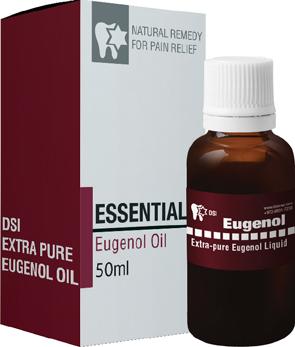Eugenol is a substance found in cloves. In addition to the distinct aroma of cloves, it’s responsible for the numbness that clove oil can induce. By integrating the reinforcing agent in the powder rather than the liquid, with this, the mixing properties are improved. A radiopaque zinc-eugenol cement is appropriate to be a lining material or temporary restorative. Eugenol is a non-irritating formula which suits the dental restoration purposes in several ways. Suggested as a solution in order to use with cement-retained implant restorations. Extra pure eugenol oil is used for the relief of insignificant dental pain and also to form sedative dentinal dressing with zinc oxide. Eugenol is widely employed in medicine because of antibacterial, anti-inflammatory, antioxidant, anticancer and analgesic properties. Eugenol (4-allyl-2-methoxyphenyl) is definitely an aromatic molecule seen in essential oils as well as other plants, including cloves, bay leaves, and cinnamon leaves. Numerous studies have shown that eugenol possesses antibacterial, antiviral, antioxidant, anti-inflammatory and analgesic effects). Eugenol has become widely employed in dentistry to deal with a toothache and pulpitis. A previous study showed that eugenol is an ideal natural agent for use in oral care products. Eugenol inhibits the development and insoluble and soluble glucan synthesis of S. sobrinus. However, the therapeutic effect of eugenol against dental caries is not thoroughly evaluated. Easy mix rapid setting zinc oxide – eugenol cement for thermal insulation and a temporary restoration.

Features:
• Perfect momentary sealant and filling material for cavities after removing of carious dentine before the permanent restoration.
• Flawless cavity liner.
• Momentary fixation of crowns and bridges.
• Perfect cavity liner under maximum restorative materials.
• Used for temporary relief of limited dental pain.
• Chemically pure with increased efficiency.
• Forms uniform paste dependability when putting together with Zinc Oxide.
• Safe beyond the relatively rare allergy, as far as I know. It has a long tradition of use as an anesthetic.
• Forms a sedative dressing or lining under non-fused resin when putting together with Zinc Oxide.
Eugenol is used as a dental filling or dental cement in dentistry. It is regularly used in dentistry if your decay is pretty deep or not far from the nerve or pulp chamber. Because of the tissue in the tooth, for example. The Pulp reacts severely to the penetrating stimulus (heat and vibration), it normally becomes relentlessly inflamed and causes a disease termed acute or chronic pulpitis. This condition typically brings about severe chronic tooth sensitivity or an actual toothache which allows it to then chiefly be treated with eliminating the nerve (pulp) called root canal therapy. Eugenol, an important part of the clove, is certainly an essential part of the dentist’s kit because of analgesic, local anesthetic, anti-inflammatory, and antibacterial effects. It is used in the form of a paste or combination as dental cement, filler, and curative material. Clove oil is an old treatment for tooth conditions that is still be used as an anesthetic by dentists all around the world, where it’s gone through many studies that confirm its effectiveness.
Zinc-Oxide-Eugenol Mix Benefits:
• Cool mix powder liquid composition.
• Quick setting.
• Real thermal and chemical insulator.
• Outstanding flowability.
• Exceptional cavity liner well-suited under most restorative materials.
• Intermediate Restorative Material.
• Base/lining under restorative materials (amalgam, silicate, phosphate, glass ionomer).
• For sealing the coronal area of teeth undergoing endodontic treatment.
The most frequent use of zinc oxide and eugenol is as a treatment of restorations. It helps inhibit pulpal irritation when setting in place for treatment of fractured teeth; lost restorations advanced caries or pulpitis. This dental material also employs a palliative (affording relief, however, not cure) impact on the pulp. Temporary Cementing Medium. Zinc oxide and eugenol are known as a temporary cementing medium for crowns, inlays, and stationary partial dentures. These fixed appliances may later be enduringly cemented with zinc phosphate cement. Intermediate Base. Zinc oxide and eugenol are utilized as an intermediate base.


